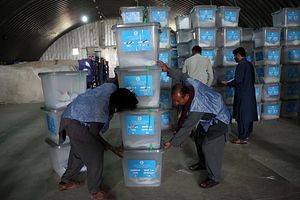Presidential elections are over, and Afghanistan now faces a period of uncertainty and possible political chaos. Saturday’s vote was marred by violence, Taliban threats, and widespread allegations of mismanagement and abuse. It was the fourth time Afghans have gone to the polls to elect a president since 2001 when the U.S.-led coalition ousted a regressive Taliban regime.
The latest election seems unlikely to bring the peace sought by Afghans, tired of an increasingly brutal war, or an easy exit for the United States, seeking to end its longest military engagement.
The preliminary vote count won’t be known before October 17 and the final tally on November 7. If there is no clear winner, a second round of voting will be held.
Initial estimates and observations at polling stations suggest a light turnout among 9.6 million eligible voters.
Afghanistan’s National Security Adviser Hamdullah Mohib said that those who turned up at polling stations “risked their lives to show that they want to be in control of their own future.”
Then and Now
For Afghans, Saturday’s vote mirrored the deeply flawed 2014 presidential polls.
Then, like now, the leading rivals for president were Ashraf Ghani and Abdullah Abdullah; then, like now, allegations of widespread fraud and a deeply flawed and sloppy election process swirled over the voting; then, like now, violent attacks marred voting, even forcing the closure of some polls. This time roughly 468 polling centers were not opened because it wasn’t possible to secure them against Taliban attacks.
In 2014, the United States stepped in to cobble together a so-called unity government fearing the allegations of fraud could plunge the country into violence. President Ghani was induced to share power with Abdullah, who was made chief executive, a new post.
International observers say there will be no mediation this time around. Before Saturday’s polls the U.S. issued stiff warnings against fraud and even seemed to take direct aim at Ghani’s government refusing to pay more than $160 million in aid projects directly to the government saying it was too corrupt.
What’s Next
The next step in the process is to bring the votes from across the country to the Independent Election Commission compound in the capital Kabul, where they will be counted again. The initial counting and recording was done at the site of the polling and then the ballots were transferred to district centers and finally to the capital.
In a country at war, Afghanistan’s security agencies say the exercise is a difficult and in some areas painfully slow process.
At a press conference on Monday, Abdullah declared, “We have the most votes in this election.”
“The results will be announced by the IEC [Independent Election Commission], but we have the most votes. The election is not going to go to a second round,” he said.
In response, Habib Rahman Nang, a senior election commission official, said that no candidate had the right to declare themselves the winner. “According to the law, it is the IEC that decides who is the winner.”
What’s at Stake?
President Ghani steadfastly maintained the elections were necessary to give the next government legitimacy as Afghanistan’s representative to negotiate with the Taliban. During a year of talks between the United States and the insurgents, Ghani complained bitterly about being excluded from the talks. Taliban have refused to talk directly to Ghani’s government, while meeting with other prominent Afghans, saying Ghani is a U.S. puppet.
Just as a deal between the U.S. and Taliban seemed imminent, U.S. President Donald Trump on Sept. 7 — just weeks before presidential polls — declared the deal “dead” blaming Taliban violence.
A presidential election result that is hotly contested and overwhelmed with accusations of fraud could threaten any early attempt to restart the peace talks.
A contested vote result could also plunge Afghanistan into violence as supporters of the leading presidential contestants are heavily armed and have long-standing animosities that could erupt into violence.
By Kathy Gannon for the Associated Press. With additional material by The Diplomat.

































